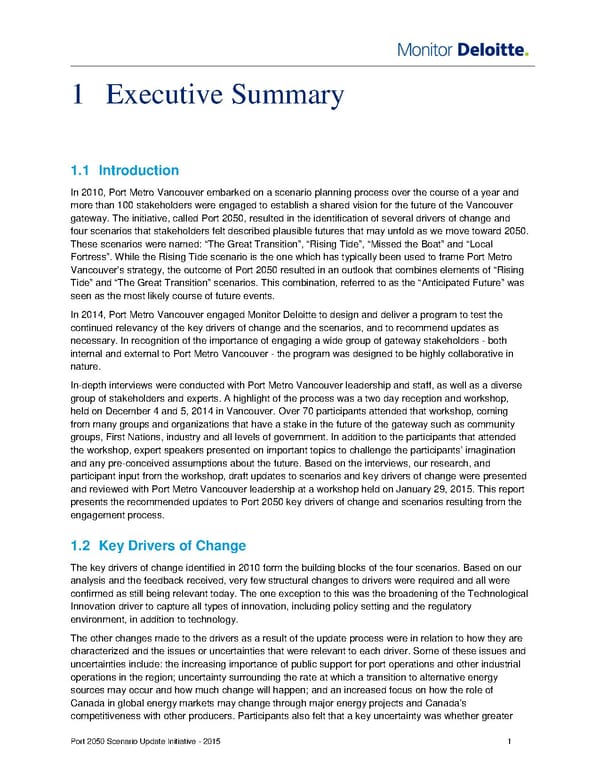1 Executive Summary 1.1 Introduction In 2010, Port Metro Vancouver embarked on a scenario planning process over the course of a year and more than 100 stakeholders were engaged to establish a shared vision for the future of the Vancouver gateway. The initiative, called Port 2050, resulted in the identification of several drivers of change and four scenarios that stakeholders felt described plausible futures that may unfold as we move toward 2050. These scenarios were named: “The Great Transition”, “Rising Tide”, “Missed the Boat” and “Local Fortress”. While the Rising Tide scenario is the one which has typically been used to frame Port Metro Vancouver’s strategy, the outcome of Port 2050 resulted in an outlook that combines elements of “Rising Tide” and “The Great Transition” scenarios. This combination, referred to as the “Anticipated Future” was seen as the most likely course of future events. In 2014, Port Metro Vancouver engaged Monitor Deloitte to design and deliver a program to test the continued relevancy of the key drivers of change and the scenarios, and to recommend updates as necessary. In recognition of the importance of engaging a wide group of gateway stakeholders - both internal and external to Port Metro Vancouver - the program was designed to be highly collaborative in nature. In-depth interviews were conducted with Port Metro Vancouver leadership and staff, as well as a diverse group of stakeholders and experts. A highlight of the process was a two day reception and workshop, held on December 4 and 5, 2014 in Vancouver. Over 70 participants attended that workshop, coming from many groups and organizations that have a stake in the future of the gateway such as community groups, First Nations, industry and all levels of government. In addition to the participants that attended the workshop, expert speakers presented on important topics to challenge the participants’ imagination and any pre-conceived assumptions about the future. Based on the interviews, our research, and participant input from the workshop, draft updates to scenarios and key drivers of change were presented and reviewed with Port Metro Vancouver leadership at a workshop held on January 29, 2015. This report presents the recommended updates to Port 2050 key drivers of change and scenarios resulting from the engagement process. 1.2 Key Drivers of Change The key drivers of change identified in 2010 form the building blocks of the four scenarios. Based on our analysis and the feedback received, very few structural changes to drivers were required and all were confirmed as still being relevant today. The one exception to this was the broadening of the Technological Innovation driver to capture all types of innovation, including policy setting and the regulatory environment, in addition to technology. The other changes made to the drivers as a result of the update process were in relation to how they are characterized and the issues or uncertainties that were relevant to each driver. Some of these issues and uncertainties include: the increasing importance of public support for port operations and other industrial operations in the region; uncertainty surrounding the rate at which a transition to alternative energy sources may occur and how much change will happen; and an increased focus on how the role of Canada in global energy markets may change through major energy projects and Canada’s competitiveness with other producers. Participants also felt that a key uncertainty was whether greater Port 2050 Scenario Update Initiative - 2015 1
 Monitor Deloitte - Final Report Page 2 Page 4
Monitor Deloitte - Final Report Page 2 Page 4